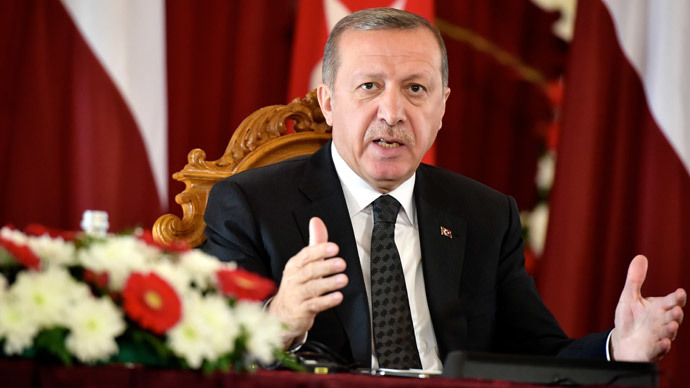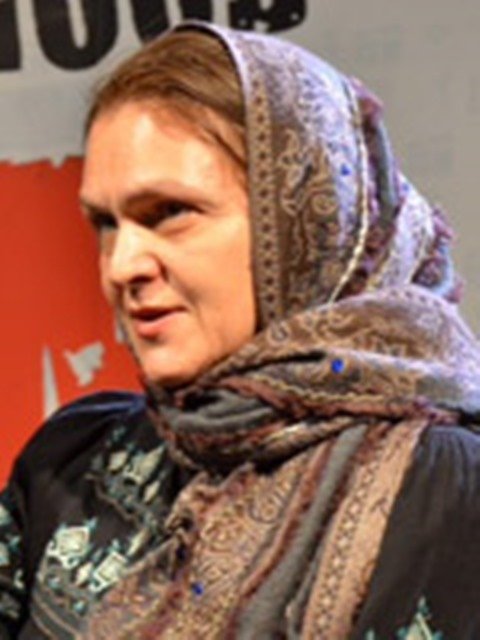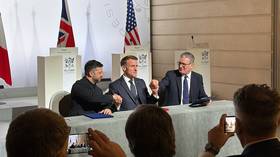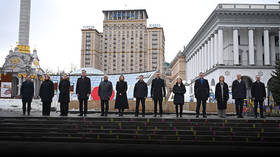Erdogan undiscovered America of Columbus

Turkish President Recep Tayyip Erdogan shook the world when he said Muslims reached America 300 years before Columbus did.
Erdogan addressed an audience of Muslim leaders from America at a summit in Istanbul on November 16. The Anadolu news agency quotes him saying that “Muslims discovered America. The religion of Islam was widespread in the American continent long before Columbus’s arrival.”
READ MORE: Before Columbus: Erdogan says Muslims 'discovered America,' eyes mosque in Cuba
Erdogan claimed that Muslim sailors reached the American continent in 1178. He explained why this event didn’t have the same results as Columbus’s discovery did:
“The religion of Islam was not used as a means to enslave, colonize, or abuse. While others are using their religions to submit and enslave even further, the Muslims and Muslim nations aspire to win the hearts, and glorify the name of Allah.”
These claims caused an outburst of sneering.
But how funny are the statements made by the Turkish president really?
How could he explain coming up with year 1178?

America’s discovery is far from being a plain topic.
There are some historic indications that the Chinese and the Vikings reached the New World long before Columbus; however these speculations don’t cause such an outburst.
If you want to research the background of Erdogan’s claims here’s what can be found on the surface. This is based on the information from the Arabic sources about traveling to the West, as well as data collected by Professor Barry Fell at Harvard Museum and other researchers as proof of Islam’s presence in America prior to Columbus’s arrival:
Although they do date the first traces of Muslims even earlier, i.e. six or seven centuries prior to Columbus.
Another important source of historic information is the world map compiled by the Ottoman admiral Piri Reis, whose full name was Haji Muhhiddin Piri ibn Haji Mehmed.
Everyone in Turkey knows about this map. It was depicted on Turkish banknotes for ten years:the reverse of the 10 million lira banknote in 1999-2005 and the 10 lira banknote in 2005-2009.
Here’s a detailed description of the map.
The Piri Reis map was drawn after Columbus’s discovery, in 1513, but it contains information unknown to Europeans at the time. It might have been based on earlier sources, probably Muslim ones, since it’s fundamentally different from classical antiquity or European maps.
The Piri Reis map was discovered in 1929 in the process of cataloguing the Topkapı Palace library in Istanbul. The map (currently kept in the Palace museum) was drawn on gazelle skin parchment, with dimensions reported as 85 cm × 63 cm or 90cm x 63cm.
Unlike the Columbus map, it depicts some islands off the coast of the Americas, the outline of South America and even the Andes, which were discovered later.
UNESCO declared 2013 the year of Piri Reis. Rome, London and other capitals, as well as Kazan, the capital of Tatarstan (Russia), held exhibitions dedicated to the subject. A ballet about the life of Admiral Piri Reis premiered in Turkey in autumn 2014.
Let’s not forget that 1492 is not only the year of Columbus’s voyage, but also the end of the Reconquista, i.e. the last of the Cordoba Caliphate was forced out of Spain.

If we close our eyes on Muslims living in Europe for 700 years and influencing it greatly, questioning the fact that Columbus discovered America seems like total ignorance.
But if we do take into consideration the Muslim contribution to European development, we get a whole different picture.
The Emirate of Cordoba (later a Caliphate) was established in the 8th Century in what is today Spain. It reached the height of its power in the 10th Century, and had a cultural influence over the rest of Europe that is hard to overstate.
The Caliphate commanded state-of-the-art navy and land forces, but it also had a university, established two centuries ahead of the University of Bologna, which today is believed to be the oldest in Europe. Christian Europeans were allowed to enroll at the university side by side with Muslims.
It was the Muslims of Cordoba that introduced Europe to Aristotle, Ptolemy, astronomy, algebra, chemistry, open seas navigation, and numerical digits as we know them. Words like “algebra,” “tariff,” “zenith,” “nadir,” “azimuth,” “admiral,” “arsenal,” “magazine”, etc. originate from Arabic, and were incorporated into European languages along with what they stand for. The checkbook, the astrolabe, the fountain pen; soap and shampoo, alcohol, perfumes, anesthesia and medical science, surgical instruments from the syringe to the surgical suture: all were gifts from Europe’s interaction with Muslims.
The Muslim world used to be several centuries ahead of Europe in terms of science and technology. Does it seem all that improbable that Muslims could sail far to the West and reach the New World ahead of Columbus?
The late Italian journalist Oriana Fallaci published a controversial book attacking Muslims in 2001, where she claimed Muslims had given the world nothing save for a few nice looking mosques.
That is an outlook shared by many. And the widespread reaction to President Erdogan’s statement in the West has largely been fuelled by its sense of total superiority over the “uncivilized,” “haughty,” “belligerent,” “backward,” and predominantly Muslim East.
But history may be different from how the West sees it in retrospect, and many of the confusions will come to be resolved in the future. So maybe we shouldn’t write off the Turkish leader’s claims as nothing more than wishful thinking?
The statements, views and opinions expressed in this column are solely those of the author and do not necessarily represent those of RT.
The statements, views and opinions expressed in this column are solely those of the author and do not necessarily represent those of RT.













